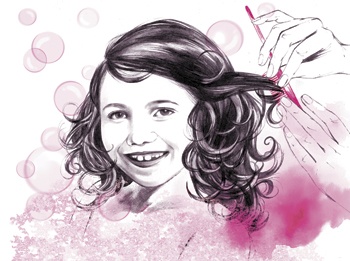It takes a full 20 minutes to comb through her curls. I sedate the riot of hair with handfuls of slick conditioner and sit just outside the tub on her yellow footstool, combing through the long, black strands that spring back into ringlets after every pull.
I never imagined I’d have the patience for this before I had children. When I think back to my life before my daughters arrived, I can’t remember doing anything quite so methodical as mothering. Nothing has ever been as demanding of skills I didn’t possess. I’d never faced so many moments when I was at the end of my rope, where I was driven to shouting at another human being, at my own child, only to apologize later, much too late, much too little.
The comb catches in a thick nest of twists and turns, and I pull her hair slightly. She rarely protests when this happens. Genetics must tie the curly haired gene with the tough scalp one. This genetic combination did not include the gene that extends graciousness to curious strangers, however. Her naturally curly hair draws compliments everywhere she goes; strangers come up to her with hands extended, trying to touch the spirals framing her tiny face and black eyes. Only a few get away with it—most times she warns them off with a staunch “no touch!”, her arms crisscrossing her head in a protective shield. Still, strangers reach for the curls in restaurants, on sidewalks, in doctors’ offices. I’m lucky. I can touch them every day.
We sit in the quiet bathroom. She’s focused on her floating toys, I on untangling, smoothing. I’ve become such a different person since I had children. I’ve become quieter, more careful, more aware of small moments. I’m acutely aware of the chasm between my friends who don’t have children and my friends who do. I’ve leaped the canyon, never sensing the moment my feet were in the air, only a few of the closest friends jumping with us as honorary aunts and uncles. Now I understand why I never saw people once they had their children, why they stopped calling, how they disappeared into thin air. I recognize the way the strange, wild space between us grew with every step their children took, toward solids, toward school, toward adolescence, toward leaving, toward never really being gone. Across the vast chasm I see my childless friends moving on quickly as I sit here, still sit here, time turning in on itself so I can see both ends of it, beginnings and endings, all wrapping around my fingers.
I risk a higher starting point on her head, thinking I’ve worked out most of the knot. But it’s no good. I’m back to the thick tangle, prying the teeth of the comb within it. She turns looking for something; the cloth has slipped back into the tub. I hand it to her wordlessly; she takes it without a glance and returns to her cups that need filling.
My father, a veteran of many marriages, always said he would never marry a woman who hadn’t had children. “They are too selfish,” he said. And I wondered, as a single woman in those days, how selfish I was. When he married a woman with three young daughters, my stepsisters, I wondered whether he would be able to share her with them.
I lean back for a moment, feeling the dull burn in my back and clean the comb out. The fine black hair, slick with the conditioner but still twisting, coats my fingers as I brush it off onto a paper towel. Stretched out, a single curl is long enough to reach her waist, yet it will bound back to her shoulder when it’s dry. I’ve never had her hair cut, nervous that the metal will somehow break the bonds of this miracle flowing from her crown.
Before mine were born, I had never really noticed children before. Now, when I meet them as I’m out without my own—in the office when someone brings her son, in the store when a 4-year-old bounds into my path—I stop purposefully. I kneel before them, look into their eyes and say hello. They smile, usually, recognizing some universal quality I’ve gained. Or maybe I just look silly, crouching like a frog.
All the tangles are out, and I take great pleasure running the comb through her hair again and again, separating strands into perfect spirals. She looks up at me.
“All done?”
No. Never. “Yes, baby. All done.”
——————–
Winter D. Prosapio has written several essays for Texas Co-op Power.


